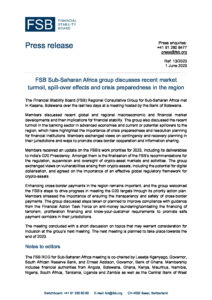Press enquiries:
+41 61 280 8477
[email protected]
Ref: 29/2023
The Financial Stability Board (FSB) Regional Consultative Group (RCG) for Sub-Saharan Africa met in Pretoria, South Africa over the past two days in a meeting hosted by the South African Reserve Bank.
Members discussed recent global and regional macroeconomic and financial market developments and their implications for financial stability. The group also shared their experiences on how the increase in sovereign indebtedness since COVID-19 has reduced the space available for governments to combat macroeconomic downturns. In an environment of subdued economic growth and rising government debt, the financial sector has increased its holdings of local government bonds in some Sub-Saharan countries. This has increased the interconnectedness between government and the financial sector and elevated the potential for spillovers of distress in one sector to another (generally referred to as the sovereign-bank nexus). Members exchanged views on the risks and policy implications that the nexus could pose to financial stability.
Members received an update on the FSB’s work priorities for the rest of the year, as well as its planned work for 2024. This includes taking forward the FSB’s roadmap to ensure the effective implementation of recommendations to address risks posed by crypto-asset activities and markets. Members shared established and prospective plans to regulate crypto-asset activities with consideration of among others, the financial stability, financial integrity and market integrity implications, as well as some of the implementation challenges members are facing.
Enhancing the resilience of the non-bank financial intermediation (NBFI) sector in the region remains important, and the group welcomed the FSB’s reports on progress toward enhancing NBFI resilience and on the financial stability implications of leverage in NBFI. Members stressed the importance of monitoring NBFI, including data, transparency and governance issues, and putting in place mechanisms to mitigate the financial stability risks in NBFI.
Notes to editors
In September 2023, the FSB and IMF published a report outlining a comprehensive policy and regulatory response to crypto-asset activities. The report synthesises the IMF’s and FSB’s policy recommendations and standards. It illustrates macroeconomic and financial stability implications of crypto-asset activities, how they may interact, and how the IMF and FSB’s policy recommendations fit together. The report also encourages implementation of the Financial Action Task Force (FATF) anti-money laundering and combating the financing of terrorism (AML/CFT) standards to address risks to financial integrity and mitigate criminal and terrorist misuse of the crypto-assets sector.
The FSB RCG for Sub-Saharan Africa meeting is co-chaired by Lesetja Kganyago, Governor, South African Reserve Bank, and Denny Kalyalya, Governor, Bank of Zambia. Membership includes financial authorities from Angola, Botswana, Ghana, Kenya, Mauritius, Namibia, Nigeria, South Africa, Tanzania, Uganda and Zambia as well as the Central Bank of West African States (BCEAO) and the Bank of Central African States (BEAC). Permanent observers include the Committee of Central Bank Governors of the Southern African Development Community and the East African Community.
The FSB has six Regional Consultative Groups, established under the FSB Charter, to bring together financial authorities from FSB member and non-member countries to exchange views on vulnerabilities affecting financial systems and on initiatives to promote financial stability.1 Typically, each Regional Consultative Group meets twice each year.
The FSB coordinates at the international level the work of national financial authorities and international standard-setting bodies and develops and promotes the implementation of effective regulatory, supervisory, and other financial sector policies in the interest of financial stability. It brings together national authorities responsible for financial stability in 24 countries and jurisdictions, international financial institutions, sector-specific international groupings of regulators and supervisors, and committees of central bank experts. The FSB also conducts outreach with approximately 70 other jurisdictions through its six Regional Consultative Groups.
The FSB is chaired by Klaas Knot, President of De Nederlandsche Bank. The FSB Secretariat is located in Basel, Switzerland and hosted by the Bank for International Settlements.
- The FSB Regional Consultative Groups cover the following regions: Americas, Asia, Commonwealth of Independent States, Europe, Middle East and North Africa, and Sub-Saharan Africa. [←]
